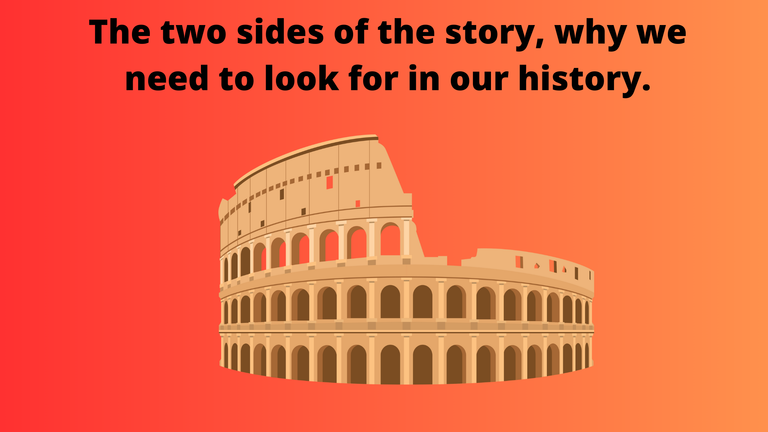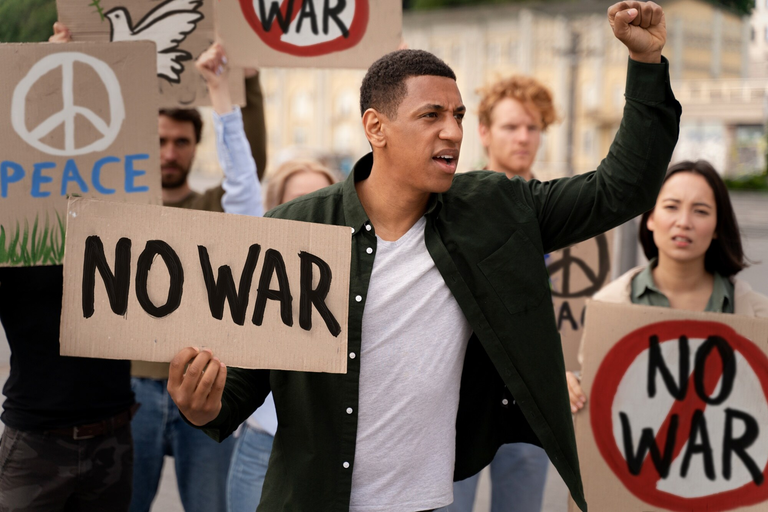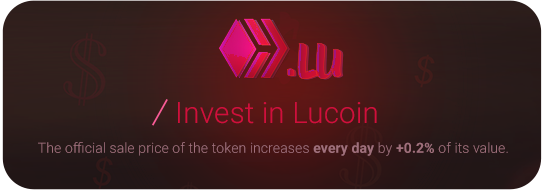
Last Friday there was a birthday lunch at work for one of the company's employees. I was chatting with a co-worker who was a bit anxious about the US election results. She was concerned about some gay friends who live in the US. The talk went in the direction where we talked about how every news we find around is biased, such as CBC, BBC, Al Jazeera, etc. And then the talk landed on another topic: Our world history education during school days. That was an interesting point because she had her basic education here in Canada and I had mine in Brazil.

My co-worker was complaining that just a while ago she noticed how her history education at school was so bad since it focused a lot on Canada's history and maybe went a bit more local, knowing about the US history and North America in general. Her partner is Russian and it looks like that triggered some curiosity to read about the history around the world, She was telling me that she went to read books about Asian countries' history a bit to understand better what happened there, including Korea and Japan. I complain a lot about my general school experience, but I am glad that my school gave me some basis and curiosity about the history of the world. And I had a teacher who triggered a curiosity about one part of history, the middle age started in Europe.
The focus of that teacher was to teach us that we learn history from a specific point of view sometimes and we need always to be open-minded and check. Usually, we learn about the barbarian attacks. Why do we call them barbarian? The Roman Empire described them as different and rougher cultures or savages. They were northern Europeans, or Germanic people (Vikings, Visigoths, etc) that invaded the Rome empire, but they had their own amazing culture. So the "barbarian" term is more from a Western point of view. So, when we learn one side of the story we are tempted to conclude wrongly an event. It was a war between different ways of life, but it doesn't mean that one is bad and the other is good. The Truth is somewhere between. @elderdark came to a similar conclusion comparing the fight of "who was the aviation's father".
We can take this to other recent events. In 1973 there was a Yom Kippur War or Ramadan War (depending on the point of view). In that year Egypt launched a surprise attack on Israel during the holiest day of the year for the Jews to take them unprepared, which was by coincidence the 10th day of Ramadan. Interesting that both countries sell the event as a total victory by each country. Israel won on the army side since the war ended when Israel's army was only 100 km from Cairo. But that event led to the pressure that Israel needed to give back some territory to achieve some peace. The interesting is how Egypt's president sold to their population that their army won that event, since the previous president Nasser lost another war against Israel, he didn't want to be seen as a loser as well. Nasser after losing the war lost the power and the leadership of the country, he didn't want the same. So both countries had their losses and victories in that war.
We can transfer this knowledge in the current conflicts around the world, but we see people blindly defending points of view that they heard on social media or biased news as my friend realized. If you ask basic questions for people heated by the moment about these conflicts you will hear dumb and biased sentences or most of the time "I don't know". So why give an opinion on something that you don't understand? That is the main problem! People want to choose the devil and the poor side when sometimes there is something between them. And choosing the side that they believe is the right just heats their internal ignorance. In these cases maybe it is better to stay without a formed opinion about the conflict and let it go. People don't need to give their opinion for every single conflict. If you think you do what is your opinion about the Myanmar conflict that is still active for more than 50 years?

Instead of choosing a side in conflicts after watching videos or news on the internet, it is better to read more about the history that is behind that event, using different sources not from only one side of the view. Because side A wrote its history and side B as well. Again citing @elderdark, he mentioned that in the future we will have a clearer what happened between the Ukraine and Russia conflict. I am not sure, since we will always have the history of the two sides, but it is up to us to know both. But we know that the winner history's version will be more popular.



Na sexta-feira passada, houve um almoço de aniversário no trabalho para um dos funcionários da empresa. Eu estava conversando com uma colega de trabalho que estava um pouco ansiosa sobre os resultados das eleições nos EUA. Ela estava preocupada com alguns amigos gays que moram nos EUA. A conversa foi na direção em que falamos sobre como todas as notícias que encontramos por aí são tendenciosas, como CBC, BBC, Al Jazeera, etc. E então a conversa caiu em outro tópico: Nossa educação em história mundial durante os dias de escola. Esse foi um ponto interessante porque ela teve sua educação básica aqui no Canadá e eu tive a minha no Brasil.

Minha colega de trabalho estava reclamando que há pouco tempo ela percebeu como sua educação em história na escola era tão ruim, já que focava muito na história do Canadá e talvez fosse um pouco mais local, sabendo sobre a história dos EUA e da América do Norte em geral. Seu parceiro é russo e parece que isso despertou alguma curiosidade em ler sobre a história ao redor do mundo. Ela estava me contando que foi ler livros sobre a história dos países asiáticos um pouco para entender melhor o que aconteceu lá, incluindo a Coreia e o Japão. Eu reclamo muito sobre minha experiência escolar geral, mas estou feliz que minha escola me deu alguma base e curiosidade sobre a história do mundo. E eu tive um professor que despertou minha curiosidade sobre uma parte da história, a Idade Média começou na Europa.
O foco daquele professor era nos ensinar que aprendemos história de um ponto de vista específico às vezes e precisamos sempre ter a mente aberta e verificar. Normalmente, aprendemos sobre as invasões bárbaras. Por que os chamamos de bárbaros? O Império Romano os descreveu como culturas diferentes e mais rudes ou selvagens. Eles eram europeus do norte, ou povos germânicos (vikings, visigodos, etc.) que invadiram o império romano, mas tinham sua própria cultura incrível. Então o termo "bárbaro" é mais de um ponto de vista ocidental. Então, quando aprendemos um lado da história, somos tentados a concluir erroneamente um evento. Foi uma guerra entre diferentes modos de vida, mas isso não significa que um seja ruim e o outro seja bom. A verdade está em algum lugar no meio. @elderdark chegou a uma conclusão semelhante comparando a luta de "quem era o pai da aviação".
Podemos levar isso para outros eventos recentes. Em 1973, houve uma Guerra do Yom Kippur ou Guerra do Ramadã (dependendo do ponto de vista). Naquele ano, o Egito lançou um ataque surpresa a Israel durante o dia mais sagrado do ano para os judeus para pegá-los desprevenidos, que por coincidência era o 10º dia do Ramadã. Interessante que ambos os países vendem o evento como uma vitória total de cada país. Israel venceu do lado do exército, já que a guerra terminou quando o exército israelense estava a apenas 100 km do Cairo. Mas esse evento levou à pressão de que Israel precisava devolver algum território para conseguir a paz. O interessante é como o presidente do Egito (Sadat) vendeu à população que seu exército venceu o evento, já que o presidente anterior Nasser perdeu outra guerra contra Israel, ele não queria ser visto como um perdedor também. Nasser depois de perder a guerra perdeu o poder e a liderança do país, ele não queria o mesmo. Então ambos os países tiveram suas perdas e vitórias naquela guerra.
Podemos transferir esse conhecimento nos conflitos atuais ao redor do mundo, mas vemos pessoas defendendo cegamente pontos de vista que ouviram nas mídias sociais ou notícias tendenciosas, como minha amiga percebeu. Se você fizer perguntas básicas para pessoas aquecidas pelo momento sobre esses conflitos, você ouvirá frases idiotas e tendenciosas ou, na maioria das vezes, "não sei". Então, por que dar uma opinião sobre algo que você não entende? Esse é o principal problema! As pessoas querem escolher o diabo e o lado pobre quando às vezes há algo entre elas. E escolher o lado que acreditam ser o certo apenas aquece sua ignorância interna. Nesses casos, talvez seja melhor ficar sem uma opinião formada sobre o conflito e deixá-lo ir. As pessoas não precisam dar sua opinião para cada conflito. Se você acha que precisa, qual é sua opinião sobre o conflito de Mianmar que ainda está ativo há mais de 50 anos?

Em vez de escolher um lado em conflitos depois de assistir a vídeos ou notícias na internet, é melhor ler mais sobre a história que está por trás daquele evento, usando diferentes fontes, não apenas de um lado da visão. Porque o lado A escreveu sua história e o lado B também. Novamente citando @elderdark, ele mencionou que no futuro teremos uma visão mais clara do que aconteceu entre o conflito Ucrânia e Rússia. Não tenho certeza, pois sempre teremos a história dos dois lados, mas cabe a nós conhecer os dois. Mas sabemos que a versão da história do vencedor será mais popular.

Posted Using InLeo Alpha




